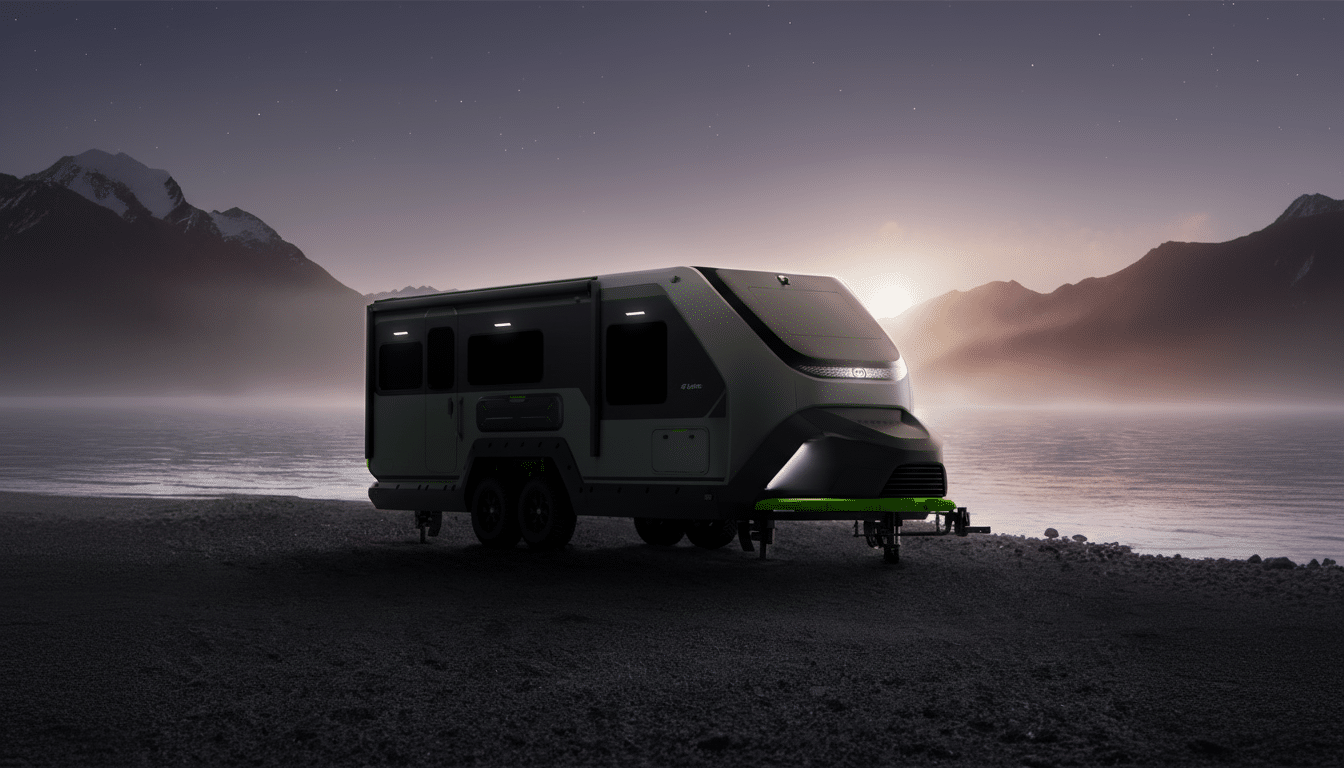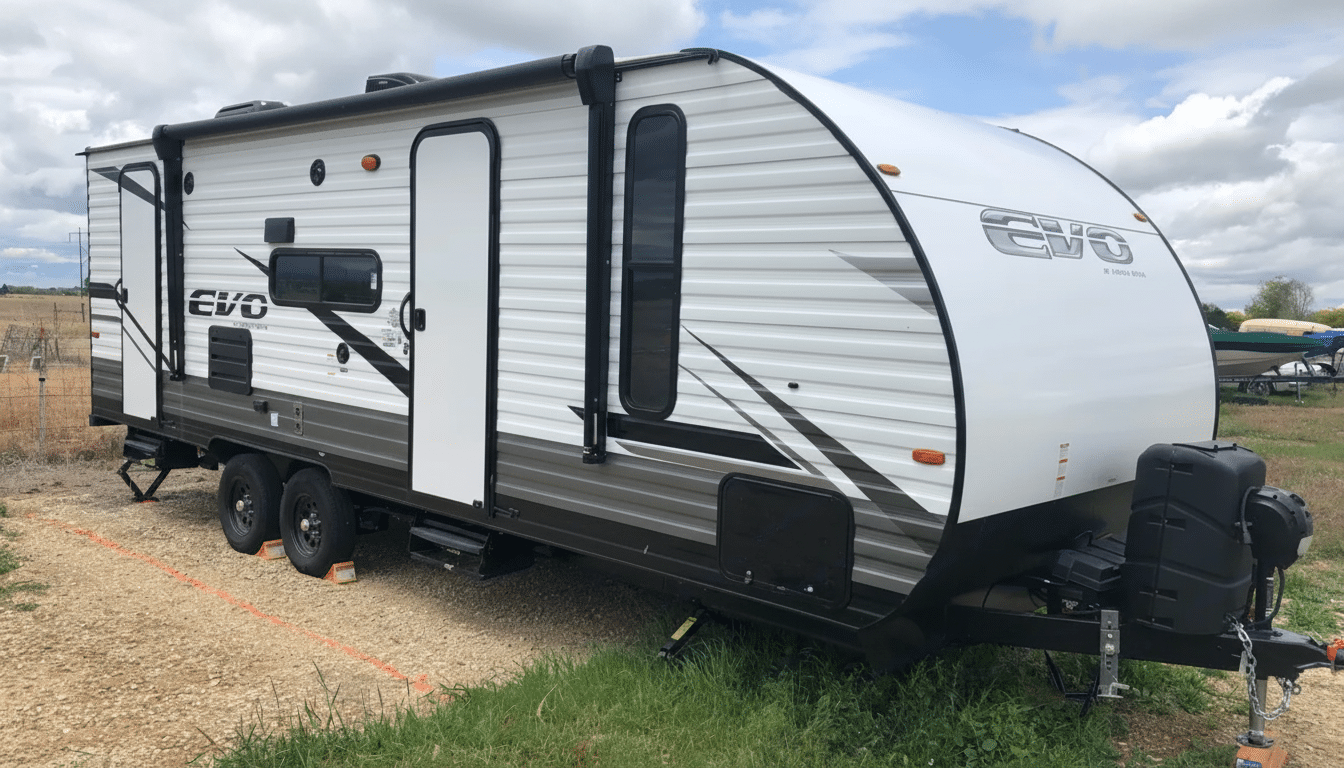Anker-backed startup Evotrex debuts with a hybrid travel trailer that combines a large onboard battery pack and an integrated gasoline engine to quietly recharge the pack off-grid. The company presents the system as a means of providing long-duration, generator-free comfort for campers able to run appliances, heat and electronics for days without having to hunt around for hookups.
Instead of using a portable generator or power from the campground, Evotrex integrates the engine into the trailer’s energy system and redirects its waste heat into the cabin to make it obsolete.

The founders claim the approach removes noise, reduces fuel use and enables true boondocking — staking a relevant position versus all-electric towables coming into scope for EV-minded buyers.
A Hybrid Spin on Defining Off-Grid Camping
Unlike a traditional RV generator, Evotrex’s design differs in two major respects: It is integrated and it operates much like a serial hybrid. The battery provides domestic power for life’s conveniences — HVAC, induction cooking, refrigeration and lighting as well as device charging — then the engine kicks on to automatically recharge the pack when necessary, enabling extended stays without reliance on the drone of a fuel-fed genset.
The move comes in a wave of innovation in towables. Lightship has unveiled an all-electric trailer with an assistive drive and axle to minimize tow load, while Pebble has touted its electric trailer with significant battery capacity and advanced automation. Grounded has gone with a modular, software-first strategy. Evotrex is gambling that a practical hybrid — quiet on battery power, efficient when the engine cycles on and off — will appeal to campers who are more interested in staying power than pure electric minimalism.
Both noise and emissions will be analyzed. The best portable generators might range in the 65–75 dB sound level at around 1/4 load, whereas some professional-grade inverter models can be much quieter. Its creator, PDC Machines, says its combined compressor-reactor unit outperforms the standard byproduct-producing equivalent and even extracts waste heat for space heating — a trick it borrows from combined heat-and-power setups. Independent testing is going to matter, especially for campers who are cognizant of quiet hours in parks and the expanding list of communities that have grown sensitive to generator noise.
Why Hybrids Are the Likely Future for RV Power
Range and recharging ease continue to represent the swing factors for adoption. Scout Motors’ CEO was recently quoted as saying that 80 percent of early adopters wanted an “extended range” hybrid setup, not a fully electric powertrain — a revealing data point for broader consumer skittishness. In the RV world, the math is much the same: Long-term off-grid stays demand a lot of energy, and many campgrounds still have nothing more than 30 or 50 amps of shore power to recharge big battery packs at a poky rate.
Towables account for the overwhelming majority of RV shipments, and increasingly more buyers want to “bring the house with them” — from induction cooktops to e-bikes and camera gear, according to the RV Industry Association. That solves the quiet, clean part of the power equation — but leaves open the recharge issue in the wild. A hybrid energy system presents Evotrex with a bridging solution: traditional battery-first operation bolstered by its internal combustion engine when the nearest rapid charge point is hundreds of miles behind.

There is also a regulatory underpinning to watch. California has imposed stricter regulations on small off-road engines, such as portable generators, which is leading manufacturers to cleaner and quieter solutions. Evotrex’s big trick will be threading that needle, meeting emissions while offering the acoustic profile and runtime that camping enthusiasts expect.
Team and Supply Chain Strategy, Source of Funding
Evotrex raises $16M in seed funding. Anker contributed funds to a round that also included Unity Ventures, Kylinhall Partners and Vision Plus Capital. The startup employs about 40 people divided across the United States and China. The trailer hails from China, and two of its co-founders come with requisite experience to navigate not only the hardware terrain but also the supply chain that can easily make or break a new entrant: The CTO previously led Geely Group’s automotive R&D, and the COO drew on experiences leading supply chains at IBM, Lenovo and Anker.
Under the plan, most manufacturing will take place in China and final assembly will take place in California. That hybridized supply chain mirrors a fact founders are upfront about: Much of what goes into an RV, down to the electronics, comes from Asia. It could also create the risk of dealing with a tariff and compliance knot — one of those perennial hurdles for mobility startups that are dancing on U.S.-China trade rules.
Co-founder Alex Xiao looks to build the product on a pretty adaptable principle: modern campers are power users. They come in with drones, cameras, laptops and e-bikes and expect full-home amenities off-grid for four or five days at a stretch, including through winter. Doing so dependably — without ever-present generator noise or a daily quest for hookups — is the mission statement of Evotrex’s hybrid architecture.
What to Watch Next for Evotrex’s Hybrid RV Trailer
Crucial specs will dictate whether Evotrex breaks out: battery size and capacity, fuel tank size, actual lower dBA sound levels and real-world runtime for heavy loads. In addition to fair pricing and dealer cooperation, the clarity of serviceability and warranty on the integrated engine and power electronics will be critical.
Expect comparisons with electric-only rivals. Models such as Lightship and Pebble have shared publicly details on batteries in the tens of kilowatt-hours, often with solar. If Evotrex were to demonstrate equivalent silent hours with a compact, clean-burning recharge cycle — and provide heat without depleting the battery — it might find a space among frequent boondockers and shoulder-season adventurists.
The RV category rewards pragmatism. The result could be a hybrid trailer that unites the quiet, electric RVing experience with the confidence of refueling for buyers too skittish over infrastructure gaps. Now Evotrex has to show that its all-in-one is not just clever on paper, but rugged and compliant as well as truly quieter in the areas that matter most — out where the wild things are.

